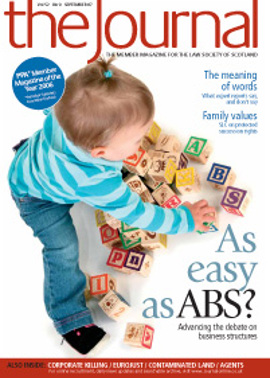A chance to succeed?

It is now nearly half a century since the last major change in succession law, the Succession (Scotland) Act 1964. Since then there have been great changes in family structure and wealth distribution in Scotland. Many more couples cohabit, the level of divorce and re-partnering has risen dramatically, and civil partnerships have been introduced. Also people are materially better off, partly as a result of increased homeownership. The 1964 Act is (and indeed has been for some time) in need of refurbishment, as is much of the centuries-old common law.
The Commission’s Report on Succession, published in 1990, recommended changes in a great many areas, but was never implemented. This was partly due to a lack of consensus about the form that protection against disinheritance should take, and partly to lack of political enthusiasm – there are not many votes in succession.
Nevertheless, succession is an important area of law which touches every family from time to time. The Commission’s present Discussion Paper on Succession (published this August and available on the Commission’s website, www.scotlawcom.gov.uk) is more limited than the 1990 review. It deals mainly with the position of a surviving spouse or civil partner on intestacy and protection of the deceased’s close family from disinheritance.
Intestacy: three rules, three defects
The 1964 Act divides an intestate estate involving a spouse or civil partner using three sets of rules: prior rights for the spouse or civil partner, legal rights (exigible only out of the net moveable estate) for the spouse or civil partner and issue, and rights to the rest of the estate. Prior rights are three in number: the housing right, the furniture and plenishings right, and a cash sum entitlement.
The present system suffers from three main defects. First, the surviving spouse or civil partner comes after the deceased’s siblings or parents, or even the descendants of a predeceased sibling, in the list of those entitled to the rest of the estate. The surviving spouse or civil partner of a childless couple may well have to share the estate with the deceased’s brother, mother or nephew. This is out of line with current views. Secondly, the share taken by a surviving spouse or civil partner depends on the housing prior right, which applies only if the deceased owned the dwellinghouse and the survivor was living there, and also on whether the estate is largely moveable or heritable. A wife who left the home following a separation will fare much worse than one whose husband was the spouse to leave. In short, estates of the same overall value but different composition may be distributed in very different ways. Finally the present system, with its five sets of rules, is needlessly complicated.
The Commission proposes to scrap prior and legal rights, and to base entitlement on the value of the intestate estate, irrespective of its composition. Where the deceased died leaving issue but no surviving spouse or civil partner, the issue, as at present, would be entitled to the whole estate. Where the deceased was survived by a spouse or civil partner but not by issue, the survivor should succeed to the whole. He or she would rank above parents, siblings and any issue of siblings.
Intestacy: competing family claims
Where the deceased was survived by a spouse or civil partner and by issue, the policy of the existing law, which gives the spouse or partner a considerable measure of priority, would be retained. But this would be achieved in a far simpler manner than at present. The suggested formula is for the surviving spouse or civil partner to get the first £300,000 plus half of any excess, with the issue sharing the other half. The surviving spouse or civil partner would also have the option of acquiring the family home using his or her succession rights and adding his or her own money as necessary.Should separated and second spouses be treated differently? The Commission concludes that the present rule, which treats all surviving spouses or civil partners in the same way, should continue. The range of situations is so great that no other simple rule is likely to be any fairer.
At present stepchildren do not succeed on intestacy. The Commission does not propose any change in this. Conferring succession rights on stepchildren without terminating their legal relationship with the other natural parent would mean that a stepchild could inherit from three “parents” as opposed to the normal two.
Where there’s a will
Legal rights are the current method of protecting a spouse, civil partner or issue against disinheritance by the deceased’s will. These are the right to a sum of money, being a fraction of the deceased’s net moveable estate. Legal rights can afford inadequate protection where the estate is mainly heritable. On the other hand they can be too much: a man with a spouse and grown-up children whose estate is entirely moveable can leave only one third of his estate by will. Moreover, restricting legal rights to moveable property means that all the assets have to be classified as heritable or moveable and debts have to be set against the correct class of assets.
As far as spouses and civil partners are concerned, the Commission proposes retaining the policy of fixed shares, but basing them on the whole estate. A public opinion survey carried out in 2005 showed little support for introducing a court-based discretionary system. The proposed share, called a “legal share”, would be 25% of what the survivor would have got had the deceased died intestate. In the absence of issue this amounts to 25% of the whole estate, but would be somewhat less if the deceased was wealthy and left issue. Thus, for example, if a woman died with an estate of £700,000 leaving a widower and two children, the widower’s legal share would be £125,000, i.e. 25% of the £500,000 he would get on intestacy under the proposed new formula.
An alimentary right?
The Commission’s first option as regards children is to give them a lump sum from the estate based on an estimate of their future alimentary needs. As in life, aliment would cease when the child became 18, or 25 if in further education. This lump sum would be due only from estate left to people who did not owe the child an obligation of aliment. A parent with a young family usually leaves his or her estate entirely to the other parent. These children would have no claim; they would be alimented by the surviving parent out of his or her own resources, augmented by the inherited estate. Grown-up children over 25 would have no claim on the estate and so no protection against disinheritance. On the other hand children whom the deceased had accepted as children of his or her family would have the same claim as biological children.
This option is controversial: legal tradition and recognition of the parent-child relationship clash with the lack of need by grown-up children (usually middle-aged when their parents die), and the absence of any input by children to their parent’s wealth (a justification for giving a spouse a fixed share). The Commission’s other option is to give a child 25% of what he or she would have got on intestacy. This formula is the same as is proposed for spouses, and automatically adjusts the children’s legal share where the deceased also left a spouse or civil partner. On the £700,000 estate given above, the children would each get £25,000 by way of the legal share, i.e. 25% of the £100,000 which is each child’s intestate share.
The formula results in children having no claim out of an estate of less than £300,000 where the deceased was also survived by a spouse or civil partner. But under the present law the surviving spouse can defeat the children’s legal rights in a modest estate by renouncing the will, so making the estate intestate. The formula for spouse or civil partner and children also leaves people with a substantial measure of testamentary freedom, in that they can always dispose of three quarters of their estates by will.
Extending the legal share to heritable property, in particular farms and landed estates, may cause problems in that the heirs may have insufficient funds to pay claims without selling the property. The Commission puts forward various suggestions, such as exempting farms and estates altogether or valuing them at a multiple of their annual profit.
Providing for the unwed
The Family Law (Scotland) Act 2006 introduced a court-based discretionary system for cohabitants. A person who was cohabiting with the deceased immediately before death can apply to the court for an award out of any intestate estate. The Commission proposes extending this scheme to testate estates. The cohabitant’s award would never exceed the legal share of a surviving spouse. Where the deceased left a spouse and a cohabitant, the latter’s claim would be based on the estate left after deduction of the spouse’s legal share, even if the spouse had been left the whole estate by will.The effect of claiming legal share or applying to the court for an award would be forfeiture of all other rights of succession. The person would be deemed for purposes of succession to the deceased’s estate to have predeceased the deceased.
Towards a single code
The Commission intends to submit a report towards the end of 2008. The draft bill annexed to the report will deal not only with the recommendations from this present consultation but also those in the other areas of succession law in the 1990 report, such as rectification of wills, new rules of survivance, and revocation by divorce of bequests made to a spouse or civil partner. It will also contain any unchanged provisions from the 1964 Act, so that Scotland would end up with a single modern statute on succession. That is the vision. It can be achieved if a clear consensus emerges on consultation and the Scottish Ministers and Parliament have the will to turn it into reality.
Dr David Nichols is a legal staff member at the Scottish Law Commission
CAUTION
During the gestation period of the discussion paper the Commission became aware of concerns about the requirement that executors-dative have to find caution. The paper presents a number of options, running from abolition to caution being required only if the sheriff considers the executor is likely to be incompetent or dishonest.
In this issue
- TUPE: stay your hand
- Nothing new under the sun
- ABS - Actual Benefit Soon?
- A chance to succeed?
- Killing in company
- Longer arm of the law
- Agents... a commercial view
- Bad language
- Remote gambling - all bets off?
- What makes a team?
- Managing the fraud risk
- Duties to the court
- Copycats: another nine lives?
- Activity in the courts
- Invoking the UCCJEA
- The men in black
- Scottish Solicitors' Discipline Tribunal
- Website reviews
- Book reviews
- Big names, big issues for annual conference
- Meet the Committee: Cameron Ritchie
- Contaminated land - where are we now?






